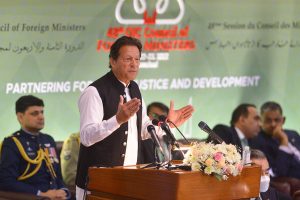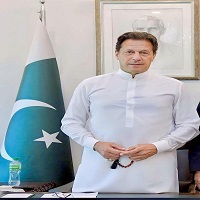Pakistan Prime Minister Imran Khan:
Imran Khan, the charismatic former cricketer turned politician, ascended to the position of Prime Minister of Pakistan after his party, Pakistan Tehreek-e-Insaf (PTI), won the general elections in July 2018. Khan’s journey from the cricket pitch to the political arena is a remarkable story of personal transformation and perseverance.

Date of Birth:
Born on October 5, 1952, in Lahore, Pakistan, Khan rose to international fame as a cricketing icon during the 1970s and 1980s. He captained the Pakistan national cricket team to victory in the 1992 Cricket World Cup, a momentous achievement that solidified his status as a national hero.
Politics:
After retiring from cricket, Khan transitioned into philanthropy and later into politics. He founded the PTI in 1996 with a vision of creating a corruption-free Pakistan based on justice and equality. Despite facing numerous challenges and setbacks, Khan’s perseverance eventually paid off when PTI emerged as a major political force in Pakistan.

Priorities:
As Prime Minister, Imran Khan has focused on several key priorities, including tackling corruption, improving governance, and revitalizing the economy. He has also placed a strong emphasis on promoting education, healthcare, and social welfare programs to uplift the marginalized segments of society.
Khan’s tenure:
Khan’s tenure as Prime Minister has been marked by both achievements and controversies. His government has undertaken significant infrastructure projects, such as the construction of the Mohmand Dam and the Khyber Pakhtunkhwa Health Reform Program. However, economic challenges, including inflation and unemployment, have posed significant hurdles for his administration.
Peace and Stability:
Internationally, Khan has sought to bolster Pakistan’s diplomatic relations and promote peace and stability in the region. He has played a pivotal role in facilitating peace talks between the Afghan government and the Taliban, as well as in mediating tensions between Iran and Saudi Arabia.
Polarizing Figure:
Despite facing criticism from political opponents and challenges on various fronts, Imran Khan remains a polarizing figure in Pakistani politics. His supporters view him as a visionary leader committed to transforming Pakistan, while his detractors criticize his government’s policies and management style.
Complexities of governance:
As Pakistan’s Prime Minister, Imran Khan continues to navigate the complexities of governance while striving to realize his vision of a prosperous and equitable Pakistan. His leadership style, characterize by determination and resilience, continues to shape the country’s political landscape and aspirations for the future.
Environmental challenges:
Imran Khan’s leadership has also been mark by his efforts to address environmental challenges, particularly focusing on issues such as deforestation and climate change. Under his government, initiatives like the Ten Billion Tree Tsunami Project have been launched to combat deforestation and promote environmental sustainability.
Furthermore, Khan has been an outspoken advocate for social justice and gender equality. His government has introduced legislation aimed at protecting women’s rights and combating gender-based violence. Additionally, Khan has emphasized the importance of empowering youth through education and skills development, recognizing them as key drivers of Pakistan’s future prosperity.
Criticism and opposition:
Despite facing criticism and opposition from various quarters, Imran Khan remains determined to implement his agenda for change. He has often reiterated his commitment to transparency and accountability in governance, vowing to root out corruption and ensure the welfare of all citizens.
Domestic issues:
Looking ahead, Imran Khan faces the challenge of navigating Pakistan through a complex geopolitical landscape while addressing pressing domestic issues. His leadership will continue to be test as he strives to fulfill the aspirations of the Pakistani people and steer the country towards a brighter and more inclusive future. Whether he succeeds in his ambitious agenda remains to be seen, but there is no doubt that Imran Khan’s tenure as Prime Minister has left a significant impact on Pakistan’s political landscape.
Improve Pakistan’s:
Imran Khan’s tenure as Prime Minister has also seen efforts to improve Pakistan’s healthcare system. His government has launche initiatives to provide affordable healthcare services to all citizens, with a focus on improving access to quality medical facilities, especially in rural areas. Additionally, Khan has prioritize the fight against polio, aiming to eradicate the disease from Pakistan once and for all.
Foreign Policy:
In the realm of foreign policy, Imran Khan has sought to strengthen Pakistan’s ties with neighboring countries and enhance its standing on the global stage. He has emphasized the importance of dialogue and diplomacy in resolving regional conflicts, while also advocating for Pakistan’s interests on issues such as Kashmir and Palestine.
COVID-19:
Despite facing numerous challenges, including economic instability, political opposition, and the ongoing COVID-19 pandemic, Imran Khan remains committed to his vision of a Naya Pakistan (New Pakistan). He continues to inspire hope and optimism among his supporters, who see him as a beacon of change in a country grappling with longstanding issues.
Prime Minister Progresses:
As Imran Khan’s term as Prime Minister Progresses, the Pakistani people eagerly await the realization of his promises and the impact of his policies on their lives. Whether he can deliver on his ambitious agenda and leave a lasting legacy remains to be seen, but there is no denying the significant role he has played in shaping Pakistan’s political landscape in the 21st century.
